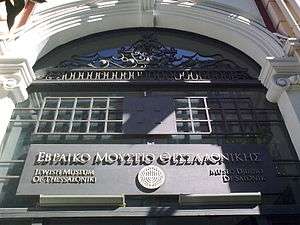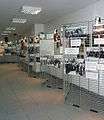Jewish Museum of Thessaloniki
The Jewish Museum of Thessaloniki (Greek: Εβραϊκό Μουσείο Θεσσαλονίκης, Ladino: Museo Djidio De Salonik) is a museum in Thessaloniki, Central Macedonia, Greece presenting the history of Sephardic Jews and Jewish life in Thessaloniki.

It is also known as: "Museum of Jewish Presence in Thessaloniki", "Jewish History Museum", Greek: "Κέντρο Ιστορικής Διαδρομής Εβραϊσμού Θεσσαλονίκης", "Μουσείο Εβραϊκής Παρουσίας στη Θεσσαλονίκη".
The museum is being run by the Jewish Community of Thessaloniki.
History
The museum is located on 13 Agiou Mina Street. The museum was opened on May 13, 2001 by Evangelos Venizelos, then the Minister of Culture and Andreas Sefiha, the president of the Jewish Community of Thessaloniki.[1] It was Sefiha who had the idea of establishing the museum and started working towards it in 1994.[2] The collection of the museum was based on the documents, ritual objects, and photographic collections as well as the library that used to be housed at Vasileos Herakleiou 26, and was known as "The Center of the Course of Jewish history, in Thessaloniki" or "Center for the Jewish Studies of Thessaloniki" or "Jewish History Centre of Thessaloniki".
In 2019, the museum opened a new wing which added four additional spaces. This included the addition of a museum shop and information on Jewish architecture and Jewish history during the interwar years.[3] The then-president of Greece, Prokopios Pavlopoulos, attended the inauguration of the new wing.[4]
Building
The building was built in 1904 by the Italian architect, Vitaliano Poselli. It housed the Bank of Athens from 1906 to 1925, then later the L'Independent, a Jewish newspaper that ran from 1909 to 1941.[5][6] The restoration of the building lasted from 1998 to 2003 and was funded by the "Organisation for the Cultural Capital of Europe Thessaloniki 1997". With the expansion of the museum in 2019, two buildings—the townhouse and the new wing—were attached by arches on their facade to connect as a single portico.[3]
Collections
On the ground level are monumental stones and inscriptions that were once found in the great Jewish necropolis that lay to the east of the city walls. Accompanying these stones are a series of photographs showing the cemetery and visitors as it was in 1914.
Central to the first floor is a narrative history of the Jewish presence in Thessaloniki from the 3rd century BCE until the Second World War. A separate exhibit focuses on the Shoah, as it affected the Jewish Community of Thessaloniki. The majority of the community - some 49,000 persons - was systematically deported to Auschwitz and Bergen-Belsen where most of them perished.
A research and documentation center operates within the premises, which aims to document and digitize archival documents from the museum's own collection as well as archival material from other sources, thus creating a database accessible to visitors.
The museum provides special educational programs for schools.
This gallery shows part of the collection as this was displayed before the museum's establishment in year 2001.
 View from outside [before 2001]
View from outside [before 2001] Exhibition of photographs relating to the Holocaust [before 2001]
Exhibition of photographs relating to the Holocaust [before 2001] The same [before 2001]
The same [before 2001] The permanent exhibition titled Thessaloniki: The Metropolis of Sephardic Jewry [before 2001]
The permanent exhibition titled Thessaloniki: The Metropolis of Sephardic Jewry [before 2001] The same [before 2001]
The same [before 2001]
Facts and figures
More than 4000 people visited the museum from September 2009 until June 2010, mainly Jews from around the world, but also researchers who wanted to access the museums archives and library.[7]
The museum is a member of the Association of European Jewish Museums (AEJM).
See also
- Holocaust Museum of Greece
- History of the Jews of Thessaloniki
- History of the Jews in Greece
- Jewish Museum of Greece
- Jewish Museum of Rhodes
References
- Aνδρέας Σεφιχά, "Αναμνήσεις μιας ζωής και ενός κόσμου", ΙΑΝΟΣ, 2010, ISBN 978-960-6882-22-7
- Βασίλης Κολώνας, "Μουσείο Εβραϊκής Παρουσίας στη Θεσσαλονίκη - Ταυτότητα, Προσανατολισμοί, Προοπτικές", Επιστημονικό Συμπόσιο "Ο Ελληνικός Εβραϊσμός", 3-4 Απριλίου 1998, Εταιρία Σπουδών Νεοελληνικού Πολιτισμού και Γενικής Παιδείας, 1998, ISBN 960-259-101-3
- "Thessaloniki Jewish Museum launches new wing". Kathimerini English Edition. 11 November 2019. Retrieved 15 March 2020.
- "President Pavlopoulos: Holocaust the Most Atrocious Crime against Humanity". The National Herald. 29 October 2019. Retrieved 16 March 2020.
- "The building of the Museum". Jewish Museum of Thessaloniki. Retrieved 15 March 2020.
- "History of this Museum". Association of European Jewish Museums (AEJM). Retrieved 15 March 2020.
- "Ισραηλιτική Κοινότητα Θεσσαλονίκης, "Απολογισμός Κοινοτικού Έργου, Σεπτέμβριος 2009 - Αύγουστος 2010 - Σανά 5770"
External links
| Wikimedia Commons has media related to Jewish Museum of Thessaloniki. |
- Official site
- Excerpt of Journal Article by Nicholas Stavroulakis
- www.sacred-destinations.com Guide to the Museum
- www.hri.org Museum of the Jewish Presence in Thessaloniki (Ag. Mina 13) >> Wikimapia shows the museum here
- www.hri.org Museum of the Course of Jewish History in Thessaloniki (Vas. Herakleiou 26) >> Wikimapia shows the "Center of Jewish Studies" here
- www.hri.org Jewish Community / Cultural
- www.sephardicstudies.org
- Hellenic Ministry of Culture and Tourism Jewish History Centre of Thessaloniki (24 Tsimiski Street)

